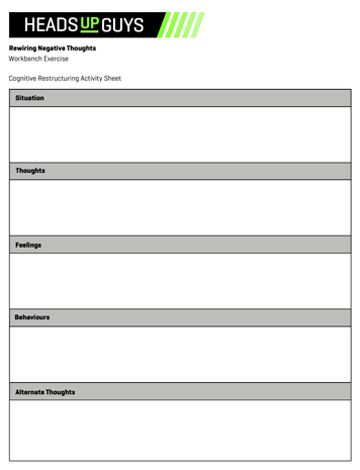Processing your thoughts in a healthier way
The worksheet provides a template and framework for us to put what we learn into practice.
The worksheet provides a template and framework for us to put what we learn into practice.
Building new habits requires practice and repetition
Throughout the course we’ll be making use of the Cognitive Restructuring Worksheet. This will also be our main take-home tool to use on our own following completion of the course.
The worksheet is useful for recording experiences, along with the thoughts, feelings, and behaviours that accompany them (we’ll address each of these in the steps below).
It helps us become aware of cognitive distortions (i.e., automatic negative thoughts) that previously went unnoticed, and unquestioned, which underlie depression. Once we shine a light on the cognitive distortions, we can then put them on trial, examining the evidence for and against these thoughts, and replace them with more adaptive and positive thoughts.
With practice, we’ll learn to identify cognitive distortions in the moment, so we can immediately challenge them.
The worksheet represents a unique, upsetting situation, along with the “thoughts”, “feelings”, “behaviours”, and “alternate thought” connected to that situation. Ideally, the worksheet is completed as soon as possible after an upsetting event has occurred or when we’ve noticed that our thoughts are starting to spiral.
To follow along, complete the steps in your notes based on a recent distressing situation, or download our Cognitive Restructuring Worksheet to fill out.
Let’s continue with Step 1. Identifying the Triggering Situation.